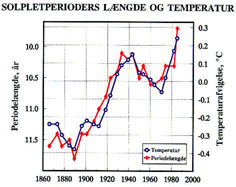Pikachu said:So you do know that more greenhouse gasses would give global warming unless feedback mechanisms disturb the effect.
Possibly. I'd like to look up the earlier papers that originally detailed the greenhouse effect. Maybe you can help by giving cites?
I suspect that after a certain point, further increases in CO2 concentration won't increase temperature. Where that is, I'd like to know, and I'm sure somebody has published it.
You say that the feedback mechanisms necessarily will cancel out the initial human caused effect, so we have nothing to worry about.
No, no, not necessarily. I mean to imply that we don't know.
At the same time you know that nobody fully understand all the feedback phenomena, and consequently nobody is able to predict how nature will respond to the human interruptions. How can you know that nature will reduce the effect? I think it is just as likely that the feedback will amplify the human caused effect!
Well, we have industry running like it is today. Then there is a speculative hypothesis that comes along that claims that an otherwise innocuous gas that we produce a lot of as a necessary consequence of our economy is going to accelerate a warming that is probably going to happen anyway.
There is a political movement that wants us to sign international treaties and force industry to pay billions to make it work.
Well, I think that the quality of the science should be directly proportional to the amount of money we're expected to spend. It isn't. In fact, this stuff is still being argued about. That bothers me a lot.
All we know is that we are changing an important parameter for our climate and consequently we know that something has to change, but we don’t know how things will change.
It's not good to dump billions of tons of CO2 into the environment without knowing the results. I don't want to imply that it is. But that is what drives our way of life. And it's not good to sign multi-billion-dollar international treaties based upon shaky science either. If you want to do that, I would expect you to know exactly what is happening.
So we know we are changing something important, but we don’t know what consequences it will have.Does this sound like responsible behavior?
Philosophically this makes sense, but remember that one of the definitions of a living thing is that it will alter its environment. There is no way around that. Just as climate change is inevitable anyway, so is some tampering with the environment.
Water vapor is also a greenhouse gas, so increased evaporation will also cause increased greenhouse effect and trap more energy within Earth.
Not necessarily, since it is an equilibrium process. The atmosphere can only contain so much water vapor before it condenses into cloud cover. Increased temperatures are more likely to increase cloud cover and precipitation than average humidities.
By the way, this suggestion of cloud cover isn't mine either. It's been mentioned by my professors and also in my environmental geology text, which said that NASA considers cloud cover the single biggest variable in the GW debate. So this isn't just my own blind speculation, it is the speculation of many others.

Anyway, this effect will not happen at all before the climate already has changed. Significantly increased cloud cover is in itself a climate change!
Of course, climate changes are inevitable regardless of whether or not there were people here.
It is a possible result of global warming, but global warming could also possibly cause icecaps to melt instead. We cannot know for sure. But of course, if glaciers grow enough to significantly increase albedo, it would be a sure sign of a major local climate change. If this happen as a result of human activities, it would truly be a human caused climate change!
The point with these scenarios is that global temperature may be at equilibrium. That's another thing we don't know.
Now you are exaggerating. Your graph indicates that changes in sun activity give temperature changes in a range up to about 1-2C or something.
The graph from Science shows a direct correlation between solar output and temperature increase, which leaves little room for anthropogenic CO2. However, that is from 1991. I am waiting for a reference that may discredit it.
Human contributions to the greenhouse effect are estimated to cause a little more change than that in the coming century.
Are estimated. You see, once again we come back to the fact that all global warming predictions are based on software models with minimal real-world data to constrain them. No matter how good your software is, you will not make up for missing data. No matter how many runs you do, you won't make up for bad starting assumptions.
Oh, and if carlos is right that this source was factually wrong, I don’t think we should take it too seriously.
And he may well be right. If he is, it's important.

 )
)



